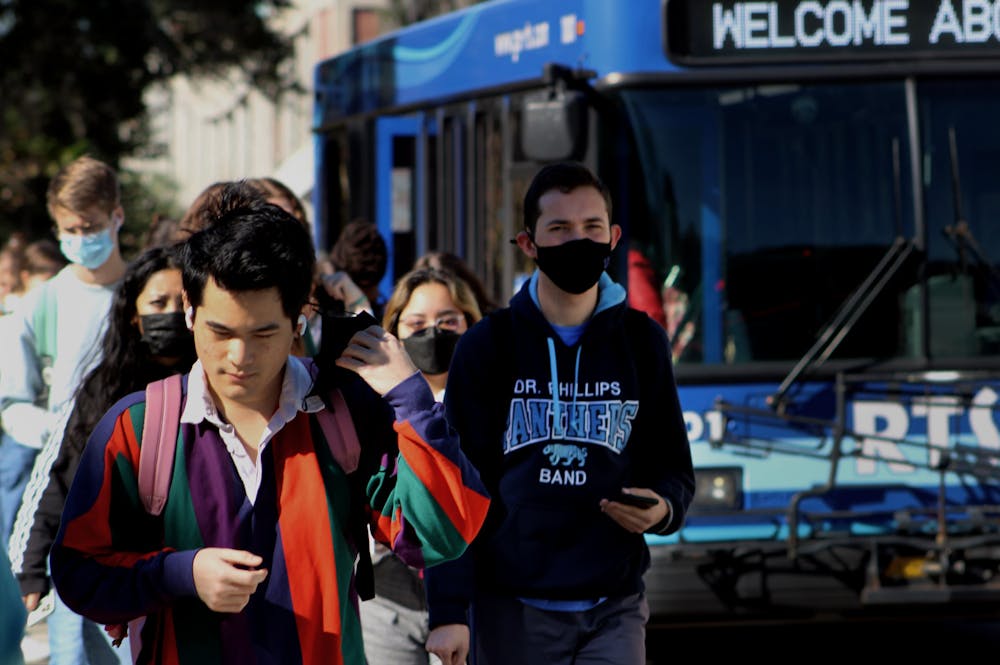UF and Gainesville transportation agencies are trying to navigate the effects of COVID-19, which have left students and community members stuck at a bus stop.
Gainesville Regional Transit System’s shortage of bus drivers has changed the ability to move around the city. RTS has reduced the frequency of certain stops, pulling nine buses from service.
The routing cuts, which began during the Fall semester, caused waits to be three to 30 minutes longer than original times, city spokesperson Rossana Passaniti wrote in an email.
Armando Ramirez, a data management analyst at UF, takes the bus almost every day to move between downtown, Oaks Mall and campus, where he works. Buses are usually about 10 minutes late, he said.
“Last semester they made a change on the schedule — like a stop leaving downtown at 4:45 — and it used to be 4:30,” Ramirez said. “By leaving downtown at 4:45, they tend to be hitting the traffic.”
RTS bus drivers have cut down from 217 drivers before the pandemic to 170. Roughly 40 driver positions are open. Daily ridership has decreased from 47,000 to 23,000 people, Passaniti wrote.
The RTS schedule for spring service — which runs from Jan. 3 to May 1 — shows 21 buses will detour for construction on campus.
UF’s Transportation and Parking Services, which oversees on-campus parking structures, fines, decal sales and other traffic-related matters, is looking to address close to $2 million in revenue that was lost since 2020, said Senior Director Scott Fox.
“During the pandemic — particularly in 2020 — we refunded some parking permit fees and we waived decal fees for the entire summer,” Fox said. “We did that for five months and the revenue loss that we experienced as a result of that was $5.7 million.”
TAPS received $3.8 million from the CARES Act in 2021 — federal aid that was distributed during the pandemic.
In the 2021-22 school year, however, TAPS still hasn’t reached 90% of sale levels before the pandemic, which are a major source of revenue. Online classes and students not returning to campus are contributing to the financial challenges, Fox said.
As a service of the university, TAPS revenue goes directly to paying salaries, maintenance, pothole repairs and even upholding the structural integrity of parking garages, he said.
TAPS worked closely with RTS to determine cuts that minimized leaving students stranded, Fox said. He said students need a way to get around if they work late nights or weekends.
On Jan. 11, the Parking and Transportation Advisory Committee — composed of UF students and faculty members — met for the first time since September. The committee reviews and recommends traffic, parking and vehicle registration mandates. Fox said during the meeting he recognized the challenge of pandemic-related losses and possible need for solutions in the future.
The question, Fox said, is if the pandemic’s effect on transportation will be long- or short-term, rather than focusing on making up lost revenue or reaching a target budget figure.
While no plans or timeline exist to do so at the moment, he said he mentioned changes to the committee like increasing parking garage or meter fees, monetizing items that are normally given for free or raising the price of parking decals.
Student decals cost $160 annually or $80 semesterly, according to TAPS’ website.
The process for some decisions like raising decal prices requires approval from the Board of Trustees and other university departments. Raising an hourly parking meter rate, for example, only needs approval within TAPS.
“If we were changing the rates at the parking meters from $1 an hour to $1.50 an hour — that's something we could probably do pretty quickly with a little bit of internal discussion and a little bit of marketing and communication,” Fox said.
Fox said they are evaluating the prices of their services to see if they need to increase prices.
“I was in no way suggesting that there is a decal price increase in the works — it is not.”
As a member of the PATAC, Senate Pro-Tempore Noah Fineberg (Gator, District A) said during a Senate meeting Tuesday evening that he would oppose raising the price of decals.
“The number one complaint I hear from students is about difficulties surrounding parking,” Fineberg wrote in an email. “I don’t want to speculate on what might happen, but I will continue to be a fierce advocate for not raising fees on students.”
Fineberg wrote that he’s open to solutions that will not negatively affect the students he represents, like whether TAPS should continue to give out certain merchandise for free.
Students and members of the Senate can expect updates from Fineberg during weekly Senate meetings in the future as Fox updates the PATAC in coming weeks and months.
Contact Maia Botek mbotek@alligator.org. Follow her on Twitter @BotekMaia.
Maia Botek is a third-year journalism major and Spanish minor covering student government this semester. Maia is from South Florida and enjoys the beach, spending time with her friends and learning about the environment in her free time.






